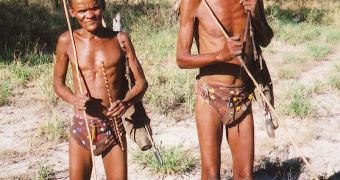Over 6.6 billion people inhabit the planet today. With all that, 70,000 years ago, no more than 2,000 people existed, as revealed by a new research carried out at Stanford University and published in the American Journal of Human Genetics. 70,000 years ago, our species was represented only by a small isolated African population, fighting to survive severe drought.
"This study illustrates the extraordinary power of genetics to reveal insights into some of the key events in our species' history. Tiny bands of early humans, forced apart by harsh environmental conditions, coming back from the brink to reunite and populate the world. Truly an epic drama, written in our DNA," said Spencer Wells, National Geographic Society explorer in residence and head of the Genographic Project, launched in 2005.
Researches focusing on the mitochondrial DNA, transmitted only through maternal lineage, have showed that modern humans are rooted in a single African "Eve", who lived about 200,000 years ago. In other words, that female established a population from which our species first evolved. About 60,000 years ago, we, Homo sapiens, went out of Africa. It was also the time when complex speech seems to have appeared. Subsequently, we colonized the world, but the African story from the moment of our emergence, until the world's colonization, is pretty elusive.
The new research focused on the mitochondrial DNA of the Khoi-San people (more familiar to us under the name of Bushmen), restricted today to southern Africa; nevertheless, even 1,000 years ago they were much wider spread across the continent (both its meridional and eastern part). Khoi-San are considered the world's oldest living race, which differentiated 90,000 to 150,000 years ago and still have a traditionally Paleolithic hunter-gatherer lifestyle.
The researchers found that humans split into small groups about 70,000 years ago; then the groups made contact again, rose in numbers and started to colonize other areas. They put all these changes on the account of the severe drought afflicting Eastern Africa 135,000 and 90,000 years ago, which divided the species into small, isolated populations evolving independently.
"Who would have thought that as recently as 70,000 years ago, extremes of climate had reduced our population to such small numbers that we were on the very edge of extinction," said paleontologist Meave Leakey, a Genographic adviser.

 14 DAY TRIAL //
14 DAY TRIAL //